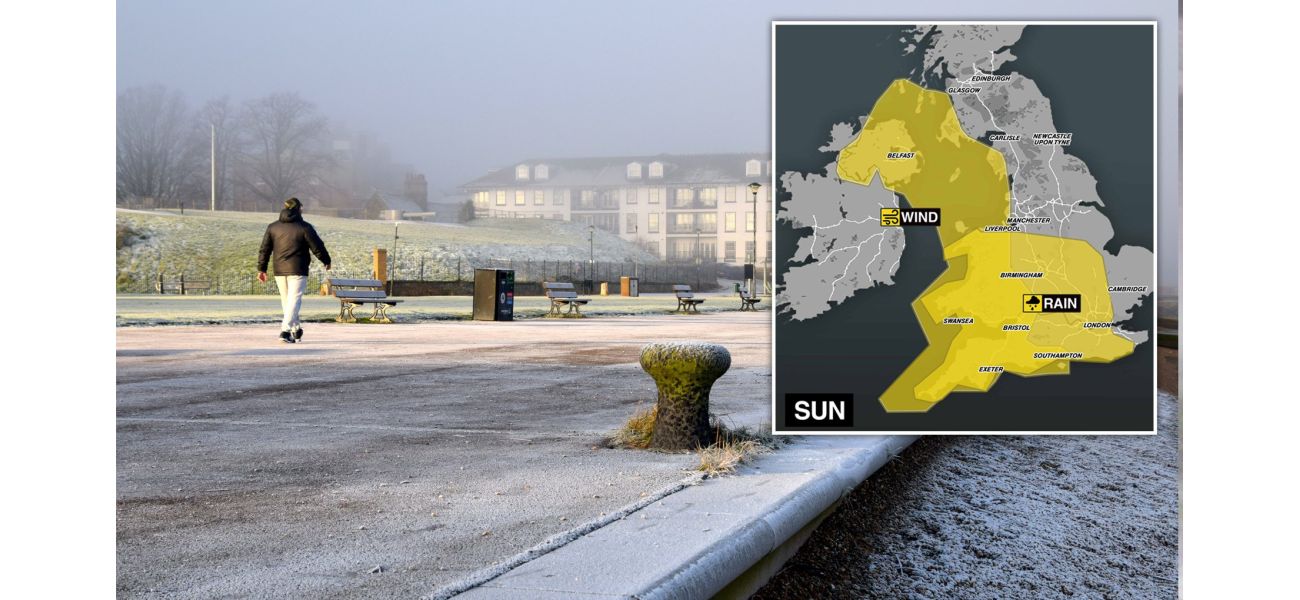Maps indicate locations of precipitation alerts in UK after Storm Eowyn.
The weather is clearing up today.
January 25th 2025.

The United Kingdom is currently facing a chaotic and tumultuous weather situation that is expected to last until Monday. The remnants of Storm Eowyn, which brought record-breaking winds of 114mph yesterday, are still lingering and causing mayhem across the country. Despite many hoping for a reprieve from the storm, the UK is still being plagued by heavy rainfall and strong winds.
The strong gale that hit Ireland yesterday morning was only the beginning of Eowyn's wrath. The winds, reaching almost 100mph, have knocked out power lines and left one million people without electricity in Northern Ireland, southern Scotland, and various areas in England and Wales. As a result, the Met Office has issued multiple weather warnings, including a rare red alert, as the winds have turned ordinary objects into dangerous projectiles. Unfortunately, the storm has already claimed a life in County Donegal after a tree fell on a man's car.
Thankfully, there is some good news in sight. The Met Office has announced that Eowyn will gradually clear out of the UK and drift into the Norwegian Sea. However, until then, there are still four yellow weather warnings in place for wind, snow, and ice. Drivers are being warned of hazardous conditions due to ice in Wales, South West England, and parts of the Midlands. Northern Ireland is also being affected by snow and ice, causing delays in public transport. In Scotland, up to 10cm of snow is expected, prompting weather officials to advise residents to prepare for the wintry weather.
Unfortunately, Scotland is not in the clear yet. Wind speeds of 70-80mph are still expected in the Northern Isles, causing further issues and disruptions. However, the winds are expected to gradually ease as the day goes on. Meanwhile, there is another storm system forecasted to hit Britain tomorrow and Monday, bringing with it heavy rainfall and strong winds. London, as well as various regions in England, are expected to receive up to 50mm of rain, which could potentially lead to flooding.
The Met Office is urging people to take caution and be prepared for the incoming storm. With the ground already saturated from previous heavy rain, the additional rainfall could cause surface water and river flooding. A yellow wind warning is also in place for the western coastlines of the UK and Northern Ireland, with winds of up to 70mph expected to whip up waves and spray. As the UK continues to face these treacherous weather conditions, it is important for everyone to stay informed and take necessary precautions to stay safe.
The strong gale that hit Ireland yesterday morning was only the beginning of Eowyn's wrath. The winds, reaching almost 100mph, have knocked out power lines and left one million people without electricity in Northern Ireland, southern Scotland, and various areas in England and Wales. As a result, the Met Office has issued multiple weather warnings, including a rare red alert, as the winds have turned ordinary objects into dangerous projectiles. Unfortunately, the storm has already claimed a life in County Donegal after a tree fell on a man's car.
Thankfully, there is some good news in sight. The Met Office has announced that Eowyn will gradually clear out of the UK and drift into the Norwegian Sea. However, until then, there are still four yellow weather warnings in place for wind, snow, and ice. Drivers are being warned of hazardous conditions due to ice in Wales, South West England, and parts of the Midlands. Northern Ireland is also being affected by snow and ice, causing delays in public transport. In Scotland, up to 10cm of snow is expected, prompting weather officials to advise residents to prepare for the wintry weather.
Unfortunately, Scotland is not in the clear yet. Wind speeds of 70-80mph are still expected in the Northern Isles, causing further issues and disruptions. However, the winds are expected to gradually ease as the day goes on. Meanwhile, there is another storm system forecasted to hit Britain tomorrow and Monday, bringing with it heavy rainfall and strong winds. London, as well as various regions in England, are expected to receive up to 50mm of rain, which could potentially lead to flooding.
The Met Office is urging people to take caution and be prepared for the incoming storm. With the ground already saturated from previous heavy rain, the additional rainfall could cause surface water and river flooding. A yellow wind warning is also in place for the western coastlines of the UK and Northern Ireland, with winds of up to 70mph expected to whip up waves and spray. As the UK continues to face these treacherous weather conditions, it is important for everyone to stay informed and take necessary precautions to stay safe.
[This article has been trending online recently and has been generated with AI. Your feed is customized.]
[Generative AI is experimental.]
0
0
Submit Comment





